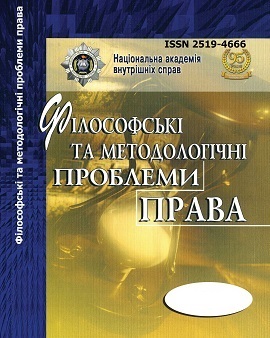Methodology of Research of the Institution of Legal Responsibility in Public Law
Abstract
The article deals with the question of methodological support, which is the leading for theoretical study of legal responsibility. Only if the methods, means and methods of scientific knowledge are properly used can achieve the goal and fulfill the research task of the institute of legal responsibility.
The relevance of this article is conditioned by the need to understand some of the methodological aspects of its study.
The purpose of this article is to outline the methods of scientific knowledge necessary for the study of legal responsibility.
It is determined that the methodology is a complex set of approaches, principles and methods of scientific knowledge, including the possibility of a comprehensive review of the phenomenon being studied.
Therefore, legal responsibility as a social phenomenon of a legal nature is considered from different ideological and philosophical positions.
It is determined that the method of legal science is a system of general, special and private methods of cognition, which are based on the dialectical method and are reduced to four types, named as materialistic dialectics, general methods, special methods, and private-law methods.
It is proved that the methods of knowing the legal responsibility are not exhaustive, since they do not cover the whole range of issues related to the subject of the study.
The system of methods for investigating legal responsibility is a phenomenon of a dynamic nature. Understanding legal responsibility by applying a multilevel structure of methods makes it possible to define it as a category of philosophical and legal level. Therefore, for its study, it is necessary to use the proportion of methods of different levels in their application.
Downloads
Abstract views: 202 PDF Downloads: 3654
Copyright (c) 2018 Philosophical and Methodological Problems of Law

This work is licensed under a Creative Commons Attribution-NonCommercial-NoDerivatives 4.0 International License.
- Authors reserve the right to authorship of their own work and transfer to the magazine the right of the first publication of this work under the terms of the Creative Commons Attribution License, which allows other persons to freely distribute published work with mandatory reference to authors of the original work and the first publication of an article in this magazine.
- Authors have the right to enter into separate additional agreements on non-exclusive dissemination of the work in the form in which it was published in the journal (for example, to post an article in the institution's repository or to publish as part of a monograph), provided that the link to the first publication of the work in this journal is maintained.
- The journal's policy allows and encourages the posting of articles by authors on the Internet (for example, in electronic storehouses of institutions or on personal websites), both before the submission of this manuscript to the editorial office and during its editorial processing, as this contributes to the creation of a productive scientific discussion and positively affects the efficiency and dynamics of citing the published work.




